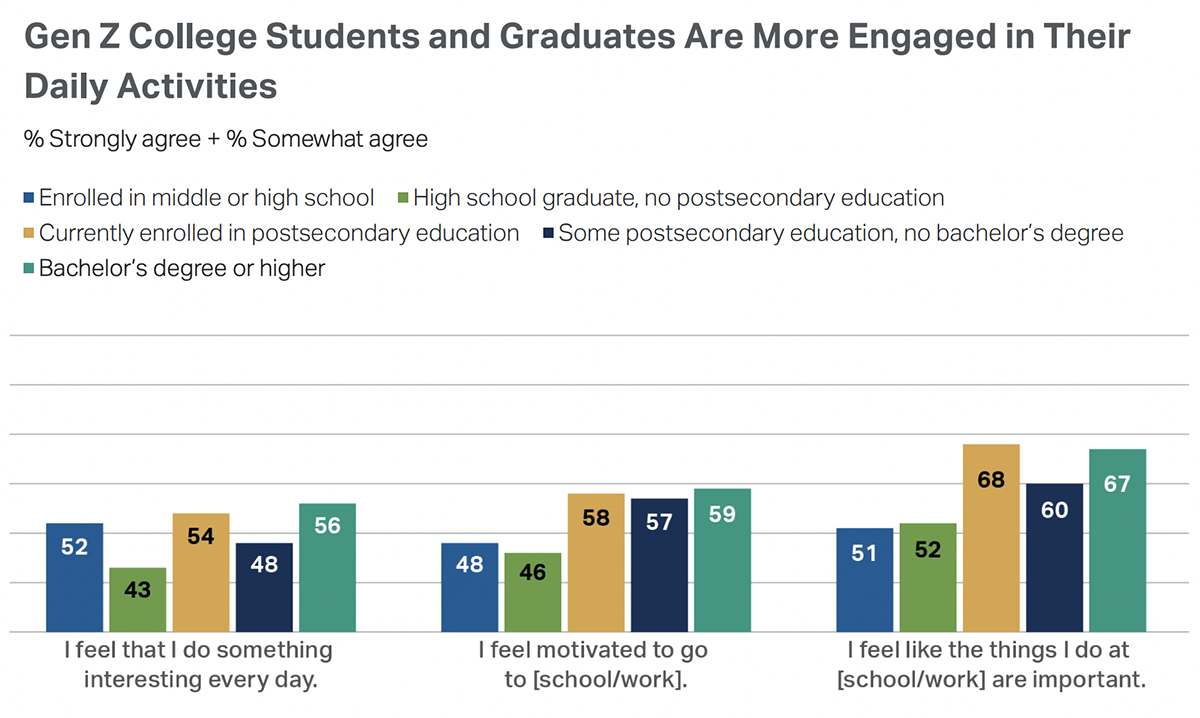Survey: Many Gen Zers say school lacks ‘sense of purpose’ and isn’t ‘motivating’
Joshua Bay | May 2, 2024
Your donation will help us produce journalism like this. Please give today.

Eamonn Fitzmaurice/LA School Report
Pursuing her passion for a career in medicine, California high schooler Ella Mayor found fulfillment working as a part-time pharmacy technician — tapping into skills she could never practice in school.
Mayor, a 12th grade student at Santa Susana High School in Simi Valley, said she is often just going through the motions in her classes where she feels disconnected from her schoolwork.
It’s the work after school that excites her.
“If you’re not engaged with school and involved in clubs and have a group of friends that help you stay around, I understand why you wouldn’t feel that sense of comfort and purpose going to school,” Mayor, 18, told The 74.
Mayor is one of many Gen Z students who feel disenchanted and disconnected from school.

California high schooler Ella Mayor
A new report from Gallup and the Walton Family Foundation surveyed more than 1,000 Gen Z students between the ages of 12 to 18, finding that less than half enrolled in middle or high school felt motivated to go to school. About half said they do something interesting in school every day.
The report found the most influential driver of Gen Z students’ happiness is their “sense of purpose” at work and school, with more than 60 percent considering themselves happy.
The sentiment among Gen Zers has forced educators nationwide to shift their strategies and way of thinking to find new ways to engage students — from offering a range of elective classes, such as graphic design and culinary arts, to internships that sync up with careers they’re interested in.
This shift also comes as a growing number of high school students value on-the-job training over other postsecondary options, including a four-year degree.

Walton Family Foundation Voices of Gen Z Study
Mayor said the survey results were “honestly not that surprising.”
She said many of her classmates have grown disconnected from school because teachers often position students’ future success with how well they perform in traditional academic courses.
“I’ve seen a lot of students struggle…but they’re good at other things like art or sports, and I feel like that’s something teachers should recognize and hone in because not every student is going to be good at academics,” Mayor said.
Tackling Student Disengagement
Courtney Walker, an assistant principal at Carrolltown High School in Georgia, addresses student disengagement by offering elective classes including graphic design and culinary arts. She also has students take career aptitude tests to gauge their skills.

“Anytime we add new elective courses, we use the [career aptitude test] data to help us plan courses that align with students’ interest that they could be very talented and successful in,” Walker told The 74.
Walker said high school students who have already completed graduation requirements are “plugged into internships.”
“We had a student a couple of years ago that really knew he wanted to become a pilot so we were able to set up an internship at the West Georgia Regional Airport,” Walker said.
“We really want to make sure we’re providing students with opportunities to dig into fields that they really are passionate about,” she added, “so that they don’t just graduate from high school but also have a plan and support in place to be successful in that plan.”

Kimberly Winterbottom, a principal at Marley Middle School in Maryland, said students need to feel “connected” with both their peers and adults, such as teachers or mentors they trust.
“We spend a lot of time trying to connect kids to what they’re interested in, whether it’s joining a club, or if they’re struggling connecting them with an adult they really respond to,” Winterbottom told The 74.
Winterbottom added how having direct conversations with students on the importance of engaging in school has proven helpful.
“Adults don’t spend a lot of time explaining to students the reasons why but I feel like when we do some light bulbs go off and students start to understand and become more invested,” Winterbottom said.
This article was published in partnership with The 74. Sign up for The 74’s newsletter here.
Disclosure: Walton Family Foundation provides financial support to The 74.